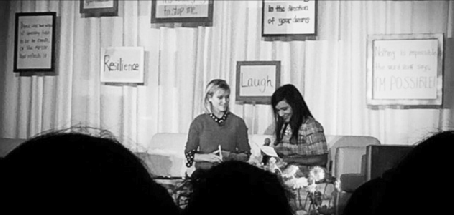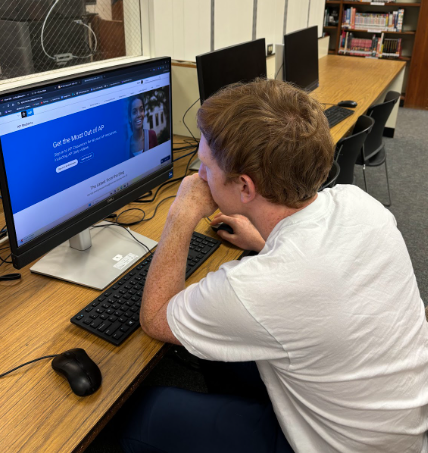As seen in the Feb. 21 print edition.
Marguerite Alberts, spotlight editor
Over 90 schools attended the second annual Young Women’s Conference at Brentwood School on Saturday, Feb. 8. The day featured many celebrity keynote speakers addressing three main topics related to the year’s theme, “It’s Our Turn”: identity, advocacy and passion.
Geena Davis, actress and founder and chair of the Geena Davis Institute on Gender in Media, a research institute that conducts the largest amount of research on gender depictions in media, opened the conference. While watching television with her daughter, Davis noticed that there were far fewer female characters than male characters in children’s shows. 
“We always want to think that things are moving along or that things are improving at a natural pace, but it’s not true,” Davis said. “The ratio of male to female characters has not changed since 1946.”
Later in the day, two speakers, Keli Lee, Executive Vice President of Casting for ABC, and Jess Weiner, author and Dove Global Ambassador, spoke on the importance of advocacy.
Weiner described the impact of social media in defining true beauty. She presented Dove’s new short film, titled “Selfies,” which documents how mothers deflect their insecurities onto their daughters.
“When we can see it, we can be it,” Weiner said.
The day concluded with an in-person interview with Former First Lady of Calif. Maria Shriver. Under Shriver’s direction, the California Governor and First Lady’s Conference on Women became the leading forum for women, thus inspiring the Young Women’s Conference.
In relation to the theme of the last keynote session, Shriver spoke of having compassion for others.
“The word care is in the word career,” Shriver said. “It’s important to focus on the people in your life and care about them. I think we can elect leaders who talk about the caring economy.”
Break the mold
USC professor Allison Trope and Executive Director of the Equality Federation Rebecca Isaacs led the discussion regarding stereotyping women in the media. Trope also runs a website, thecriticalmediaproject.com, which provides over 250 media artifacts for teachers to incorporate in their lessons.
“Breaking the mold starts with awareness. It starts with understanding what is out there in the media,” Trope said. “The mission of the critical media project is to foster media literacy.”
Trope brought up the history of stereotyping, stating that stereotypes start with ideology.
“Ideology refers to a shared set of values that we all hold. That history means that they [ideologies] all get internalized,” Trope said. “We don’t question them. We aren’t advocates for ourselves. We don’t think about why that needs to be changed because it’s just the way things are.”
Isaacs concurred with Trope and further added that people fear change, but they are becoming more accustomed to women in power.
“There are historical influences that are very strong that have created historical patriarchy that people are reluctant to give up,” Isaacs said. “That change has to be taken, not given. These are structures that are torn down bit by bit. In some place it occurs more slowly than in other places. It’s based on fear and it’s based on keeping women from obtaining power that they rightfully have.”

Lead with Our Heart
“Leaders recognize those moments of inspiration and moments of opportunity and they seize them.”
In a male dominated profession, Dr. Kathy Magliato had to develop a thick skin to compete with her colleagues and become a leader. Magliato, currently the Director of Women’s Cardiac Services at Saint John’s Medical Center, told conference attendees about her personal journey to become a cardiothoracic surgeon.
In her presentation, Magliato discussed the five principles that led her to become a great leader.
The first principle was failure, which she explained, builds character.
“It’s about failing and moving on,” Magliato said. “You are all going to fail, but it will change you as a character and you will move on.”
Then Magliato spoke of roots and wings, roots being the foundation children need to grow and wings representing the freedom children need to make their own decisions.
“Roots and wings for children are everything,” Magliato said. “Great leaders are grounded in principles”
The third principle Magliato lives by is “drinking from the fire hose.” As someone who went back to school in her forties, Magliato stressed the importance of education and learning everything one can.
“Great leaders continuously learn and feed their brains,” Magliato said. “You have to constantly educate yourself in your environment all of the time.”
Furthermore, Magliato firmly believes in what she calls “the house of yes.” She emphasized that successful people should surround themselves with people who believe in and support them.
“If someone tells you no, go out and find someone to tell you yes,” Magliato said.
Lastly, Magliato is driven by her motivation: time. She believes that each person is given a certain amount of heart beats in their lifetime and that they must make the most of the time that they have.
“No matter what you face in the morning, if your feet touch the ground, it’s a good day,” Magliato said. “You’re here, you made it, you’re alive.”
Talk about relationships
“I first want to congratulate you all for making it up those stairs,” poet and spoken word artist Azure Antoinette laughed as she spoke. “By the time I climbed halfway up the stairs, I was convinced that [Brentwood School] was the first stop to heaven. You girls get to work out so much.”
Antoinette and Kimberly Wolf, the founder of ShimmerTeen.com, a soon-to-be launched platform for teenage girls’ health, wellness and beauty information, addressed both mothers and teenage girls’ concerns about different types of relationships in their lives. Throughout the engaging session, Wolf emphasized looking for signs of a healthy and unhealthy relationship.
“You know a relationship, whether it’s that of a friend, family or your significant other, is unhealthy when that other person is taking energy away from you and not giving it back,” Wolf explained. “You are someone’s version of perfect and you should not feel obligated to keep an unnecessary relationship going, especially when you know it’s hurting you.”
Antoinette, however, added that not all relationships should be “given up so easily.”
“Compromise and forgiveness are key factors in developing a healthy relationship,” Antoinette said. “But at the same time, ask yourself: Do they add or subtract to your life?”
Both presenters noted the importance of communication in establishing a trustworthy relationship and the advancement of technology affecting relationships negatively.
“We send emojis to each other and tweet about everything we do these days,” Antoinette said. “These convenient tools, however, take away moments in your life that you should really enjoy. Try to put down your phones when you are having lunch with friends and family. You really don’t need to post another picture of a delicious-looking sandwich.”
Question the media
CEO of the Geena Davis Institute on Gender in Media Madeline Di Nonno illuminated the truth of gender bias in media throughout the session. Di Nonno, who had been involved in executive leadership experience in the entertainment, non-profit, digital media and consumer packaged goods industries, found her passion in helping young women become more prominent on screen when she met with Davis to discuss the growing concern for gender inequality.
“I have been in the entertainment industry for so long, but I never really realized the gender bias in media until I discussed it thoroughly with Geena,” Di Nonno said. “I mean, can you believe that the ratio of male to female characters in films is only three to one? We make up half of the population, but not half on screen.”
Although the media has made its efforts to include more women on screen and in the workforce, Di Nonno noted that gender equality still has “a long way to go.”
“As Geena [Davis] said in her keynote speech, if we add women to the Congress at this rate, it will take us 500 years for parity between men and women in Congress,” Di Nonno explained. “We need more women in leadership positions to push for this equality.”




























